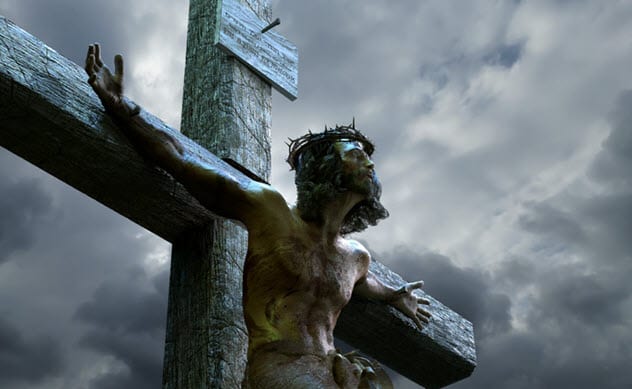However, even within a religion, there can be debates among the faithful. These might strike outsiders as funny, but to those in the middle of them, they can have serious, even deadly, consequences. Here are 10 of the most bizarrely important debates in major religions.
10 Did Adam Have A Belly Button?
In the beginning, God created the first man, Adam, from clay and breathed up his nostrils to give him life. For some believers, the story of man’s creation in the Bible makes complete sense and is flawless. Unfortunately, there are parts of the narrative not covered in Genesis that have left holes for some doubters to poke in. Such as Adam’s navel. For hundreds of years, scenes of the Garden of Eden have been popular in religious art. This has left artists with a dilemma. Should Adam and Eve have belly buttons? The belly button is what remains of the point where the umbilical cord was attached to us in the womb. Since Adam was made without a woman’s help, would God have given him a navel for purely aesthetic reasons? Some artists fudged the question by extending fig leaves over the lower abdomen, some painted them smooth-bellied, and some decided that the first humans did indeed have navels. Of course, this leads to the secondary question of whether they were innies or outies. Creationists still argue this matter today. Some claim that the lack of a belly button would have been proof of God’s greatness to all those who met Adam and Eve.[1]
9 Are You Damned?
In the Calvinist interpretation of Christianity, since before the beginning of time, God has always known everything that will occur. More than that, everything that happens must transpire according to God’s will. Therefore, some people are destined to be saved and taken to Heaven while others are preordained to go straight to hell for all eternity. The “elect” (as the saved are called) do not do anything to earn God’s reward because salvation is a gift of His grace. On the other hand, those preordained to damnation cannot win God’s love through good acts. In fact, the idea that God created some people just to toss them into a pit of fire goes back to the earliest days of the Church. In the early fifth century when the British monk Pelagius said that humans were capable of choosing to do good or evil without God’s help, he was branded a heretic, condemned, and thrown out of Jerusalem.[2] The idea that you might be going through your life doing wonderful things and yet still be bound for hell was one that tormented many Christians in the past. Today, though, you rarely meet anyone who doubts that the pearly gates will swing open for them.
8 What Happened To Jesus’s Foreskin?
Despite what many later Christians would think, Jesus was a Jew. Born in Judea around 4 BC, He was treated in the traditional Jewish way. His foreskin was lopped off on the eighth day after His birth as part of a deal made with God centuries earlier with Abraham: “For the generations to come, every male among you who is eight days old must be circumcised, including those born in your household or bought with money from a foreigner—those who are not your offspring.” And the New Testament duly records that Jesus was circumcised. This would create many questions for later Christians but also many opportunities. Everything associated with Jesus would later become a relic of great importance. Everything from His burial shroud to the nappies He wore in infancy were venerated. There were enough pieces of the True Cross to build a ship. Although there were many relics that were pieces of saints’ bodies, Jesus, who was taken up bodily into Heaven, did not leave any physical remains behind—except, of course, His foreskin. The Holy Prepuce, as it is known, popped up in many cathedrals for pilgrims to worship in front of. Traders in relics did a brisk business in them. Saint Catherine of Siena claimed that she had been given the foreskin as a wedding ring during her mystical marriage to Jesus. One astronomer declared that it had been taken up to Heaven and could now be seen as the rings of Saturn.[3] In 1900, the Catholic Church realized that the Holy Prepuce was a cause of amusement for some. So the Pope decreed that anyone who even mentioned it would be excommunicated.
7 Do Christians Have To Be Circumcised?
Though Jesus promised the Kingdom of God would come soon, there seemed to be a bit of a holdup after His death. This meant that Christians had to work out how to live as Christians and not just wait for the end of days. This led to lots of debates in the early Church about what it meant to be Christian.[4] All the earliest Christians were Jewish. But as Gentiles began to join, there were questions about how Jewish that had to be. Did they have to follow the dietary laws of the Jewish Bible? As recorded in the Book of Acts, St. Peter and St. Paul took differing views on this matter. Even messier was the painful issue of whether Gentile Christians first had to be circumcised. The very first council of the Church was called to settle the matter. According to Acts, the council met and nicely agreed to send out letters telling Gentiles they did not need to be circumcised. In his letter to the Galatians, St. Paul casts the debate in a more confrontational light: But when Cephas [Peter] came to Antioch, I opposed him to his face, because he stood condemned. For prior to the coming of certain men from James, he used to eat with the Gentiles; but when they came, he began to withdraw and hold himself aloof, fearing the party of the circumcision. The rest of the Jews joined him in hypocrisy, with the result that even Barnabas was carried away by their hypocrisy.
6 Should Christians Castrate Themselves?
Theological debates can often be cutting. For Origen, an early Church Father, his misreading of a text led to him losing more than his way. According to historian Eusebius, Origen read in the Gospel of Matthew: “There are eunuchs who have made themselves eunuchs for the Kingdom of Heaven’s sake.” Origen took the words at face value and castrated himself.[5] Unfortunately for Origen, this was a bit of a blunder. The Old Testament makes it quite clear that no man suffering defects, like “festering or running sores or damaged testicles,” may be a priest of God. Word soon spread about what Origen had done, and while others were discouraged from following his actions, Origen was allowed to be ordained. Some say that his aim was to be able to teach young women about Christ without suffering temptation. Others say that he was simply following what he thought was the Word of God. Today, some scholars think that the entire tale about Origen may just be ancient gossip. Either way, it seems that there are some limits to how far faith should drive you.
5 Snake Handling
In the Gospels of Mark and Luke, followers of Jesus are told: “And these signs shall follow them that believe. [ . . . ] They shall take up serpents; and if they drink any deadly thing, it shall not hurt them” and “I give unto you power to tread on serpents and scorpions . . . and nothing shall by any means hurt you.” Some people have taken these verses in a strict sense. In some small churches, particularly in the United States, congregations pick up and worship with deadly venomous snakes. Despite the Bible saying that this should be a harmless task, many people have been bitten and have died during these services. In 2014, Pastor Jamie Coots was killed by a snake bite.[6] His son also came close to death when a snake bit his throat four years later. Not many Christians consider the practice of snake handling to be a reasonable part of worship. After all, Jesus also said, “Do not put the Lord your God to the test.”
4 Transubstantiation vs. Consubstantiation
Even when they don’t involve cutting body parts or playing with deadly animals, theological debates can be fatal. In the contest between transubstantiation and consubstantiation, many people have lost their lives. Are bread and wine really capable of being transformed into flesh and blood? Those who believe in transubstantiation hold that the bread and wine used in Mass really are transformed into the body and blood of Christ. Those in favor of consubstantiation think that it is a symbolic action. Holding either of these ideas at the wrong time and in the wrong place could easily lead to your death. During the Reformation, a fierce battle took place as to which view of the Eucharist was the right one. When Archbishop Thomas Cranmer declared that he had written a book with the “true doctrine of the sacrament,” the Protestant bishop was burned at the stake by the Catholic Queen Mary.[7] Even today, the real or symbolic presence of Jesus at Mass is a point of contention between different branches of Christianity.
3 Is The Soul In Blood?
According to Jehovah’s Witnesses, the seat of the soul in humans is not the brain but rather the blood. They take texts from the Bible such as “the soul of every sort of flesh is its blood” and “Abstain . . . from blood” in a strict sense.[8] This belief would be a fairly harmless quirk of dietary law if not for the fact that much of modern medicine relies on the ability to transfuse blood from one person to another. Due to their beliefs, Jehovah’s Witnesses refuse to allow another person’s blood inside their bodies. They can—and regularly do—die because they cannot be treated with the most effective methods. Whether the biblical injunction against using blood is worth dying for is one that each individual has to wrestle with for himself.
2 Blood Of Christ
As we have seen, blood has caused a lot of bloodshed in the history of Christianity. For many people, there is no more important blood than that which Jesus shed for our sins with His death. Several texts hint at it playing a key role in the redemption of humanity. The Gospel of John’s account of the crucifixion includes the detail that “one of the soldiers pierced Jesus’s side with a spear, bringing a sudden flow of blood and water.” The inclusion of water was probably meant to bring to mind ichor, the blood of pagan gods, that was supposed to resemble water. People have focused on the blood of Jesus for a number of religious debates. Jesus was supposedly both God and man at the same time. So was His blood divine, human, or both? Would Jesus’s blood decay like human blood or stay incorruptible? This was an important question for those who wanted to sell relics that they claimed held Christ’s blood.[9] Others believe that Jesus’s blood was returned to His body during the Resurrection. Then it went with Him into Heaven when He ascended. Some teach that while the blood did go back up to Heaven, it remains separate from the body there, possibly in a bowl or vial.
1 Cannibal Babies
Resurrection is a difficult trick to pull off, and the practicalities of it have vexed the greatest theologians. Does your body need to be intact when you are buried? If you are cremated, will the particles of your body be reassembled on Judgment Day? Perhaps the most complex issue arose from cannibals who had babies. If a cannibal ate your body, how would you be resurrected? For Saint Augustine, this issue had a fairly easy solution. The flesh would “be restored to the man in whom it became human flesh,” meaning the person who was eaten gets the body back from the cannibal. Other theologians asked an even more vexing question: What if the cannibal had a baby? If a baby was conceived and created wholly by the consumption of human flesh, what would happen at the Resurrection? All the baby’s flesh would have to be taken away and returned to the original person who was eaten. Luckily, St. Thomas Aquinas came up with a solution to be used at the Resurrection: “If something is lacking, it can be supplied by the power of God. Therefore, the flesh consumed will rise in him in whom it was first perfected by the rational soul.”[10] He added that if any matter was missing, it would be made up from other things that a person had eaten over the course of his lifetime. Woe to the poor cannibal who only eats human flesh.






















